DIG Bhullar Arrest Shatters AAP’s Anti-Corruption Image
Panjab: DIG arrested in graft case; Flood Compensation, Livestock Health, BBMP Proposed Restructure; Delhi’s AQI Skyrockets; Tarn Taran By-Poll Heats Up. Sikh: California Vetoes Transnational Repression Bill; Varanasi Court Dismisses Case Against Gandhi—and more stories.

DIG Bhullar Arrest Shatters AAP’s Anti-Corruption Image
India's Central Bureau of Investigation (CBI) arrested Panjab’s Deputy Inspector General of Police (DIG) of Rupnagar range Harcharan Singh Bhullar on graft charges from his Sahibzada Ajit Singh Nagar (SAS Nagar) office on 16 Oct. CBI has recovered INR 7 crore (USD 795K), 1.5 kg gold, keys of luxury cars, 40 bottles of imported alcohol, and papers indicating ownership of various properties. A former hockey player turned middleman Kirshanu Sharda has also been arrested on the basis of a complaint by Akash Bhatta, a scrap dealer from Mandi Gobindgarh. Bhullar is the son of former Panjab Director General of Police Mehal Singh Bhullar and was directly inducted into Panjab Police without appearing for exams in 1993–94 as a Deputy Superintendent of Police. He was promoted to the Indian Police Service in 2016. Bhullar has now been suspended and sent to 14-day custody. The arrest has shattered the Aam Aadmi Party’s (AAP) claim of corruption-free government in Panjab. On 18 Oct, the Panjab Governor Gulab Chand Kataria said Bhullar’s arrest in a graft case served as a wake-up call as it showed ‘rampant corruption in higher echelons’. He wondered how corruption on such a scale went unnoticed despite vast administrative machinery in place. There are a couple of speculations why the CBI targeted Bhullar. One is with the state election just 15 months away, the Bharatiya Janata Party government in New Delhi which must have cleared the CBI action wanted to shatter AAP’s claim of being corruption free. Another is Bhullar’s Rupnagar police was recently involved in a face off with Chandigarh police over a Jaipur resident Navneet Chaturvedi nomination to the recent Rajya Sabha (Upper House of Parliament). Chaturvedi’s papers were rejected and AAP’s Rajinder Gupta has been elected. Yet another reason is in May 2025 the Panjab government deployed the Bhullar’s Rupnagar police to provide security of the Nagal Dam despite the Union Home Secretary asking to withdraw the police. Bhullar’s arrest has sent a signal to corrupt officers in the Panjab government. Strangely, neither AAP nor any other political party except Indian National Congress’ Sukhpal Singh Khaira have commented on the development (earlier coverage).

India, Canada FMs Meet; Trump Claims India Will End Importing Russian Oil
On her first official visit to India, Canada's Foreign Minister Anita Anand met her counterpart Indian External Affairs Minister Subramanyam Jaishankar and Prime Minister Narendra Modi. Ties between the countries had plummeted after Sikh separatist leader Hardeep Singh Nijjar was assassinated on Canadian soil in June 2023. Signs of a thaw have appeared in 2025 since Mark Carney took over as Canadian PM. In August 2025, India appointed Dinesh Patnaik as the new High Commissioner to Canada. After the meeting of their foreign ministers in Delhi, the two countries announced a series of measures, including starting ministerial-level discussions on bilateral trade and investment. A joint statement said, 'Reviving this partnership will not only create opportunities for enhanced economic cooperation but also help mitigate vulnerabilities arising from shifting global alliances.' However, the issue of transnational repression is missing in the statement. Meanwhile on 15 Oct, the US President Donald Trump said that Modi had told him India will stop buying oil from Russia, a move Trump described as a 'big step' in efforts to isolate Moscow economically. Neither has the Indian embassy in Washington responded to questions about such a commitment by Modi, nor has India responded in any substantial manner to the declaration by Trump. In an oblique remark, Trump also said, ‘I don't want to destroy his (Modi’s) political career.’ Modi is silent on this matter of foreign relations and India’s image, just like he has been during every crisis in the past 11 years. Earlier in September 2025, the US had withdrawn the sanctions waiver granted to Iran’s Chabahar port being developed by India. The US had granted the waiver in 2018 during Trump's first term (2017–2021). Chabahar is of strategic importance to both Iran and India. It can potentially help Tehran ward off the effect of Western sanctions and offers New Delhi an alternative route that bypasses Pakistan, which does not allow India land access for trade with Afghanistan and Central Asia. Concurrently, New York City has officially named a street after the ninth Sikh Sovereign Guru Teghbahadar whose 350th martyrdom anniversary falls on 24 Nov (earlier coverage).

California Governor Vetoes Transnational Repression Bill; UK Rape Arrests
On 13 Oct, California’s Governor Gavin Newsom vetoed bill SB-509 that would have trained local police on how to recognize and intervene when a foreign government appears to threaten members of its diaspora who express political dissent against their home countries. Known as 'transnational repression', these intimidation tactics by foreign governments range from online harassment and digital surveillance to physical assault and extrajudicial killings. US-based human rights organization Freedom House researchers have found that transnational repression is becoming increasingly common worldwide. The Sikh diaspora has found itself in the crosshairs of transnational repression by the Indian government, as several outspoken Sikh activists in the US and Canada have been targeted, surveilled, and in some cases, killed in attacks that activists say were orchestrated by individuals with links to the Indian government. Though SB-509 did not name specific countries, debate around the bill has inflamed political divisions among South Asian groups in California. Three Sikh organizations, alongside progressive Indian and Kashmiri advocacy groups, stressed that the bill would protect vulnerable immigrant and refugee communities in the state. The most vocal criticism came from two influential Hindu advocacy organizations: Hindu American Foundation (HAF) and the Coalition of Hindus of North America who argued that Hindus’ political speech would be criminalized should it align with the Indian government, including criticisms of the Khalistan movement. HAF had also appealed to pro-Israel and Jewish groups to join the opposition to the bill. Newsom said he believes the governor’s administration and federal agencies are best positioned to address transnational repression and codifying the definitions presented in the bill would hamper the state’s ability to respond. However, Newsom's track record on contentious issues leaves much to be desired. He had earlier vetoed the SB-403 Caste Discrimination Protections and has remained silent on the 1984 Sikh Genocide in India. Meanwhile in UK, a 49-year-old man and a 65-year-old woman have been arrested in connection with the rape of a Sikh woman in Oldsbury, West Midlands in September 2025. The police have earlier described the attack as racially motivated (earlier coverage).
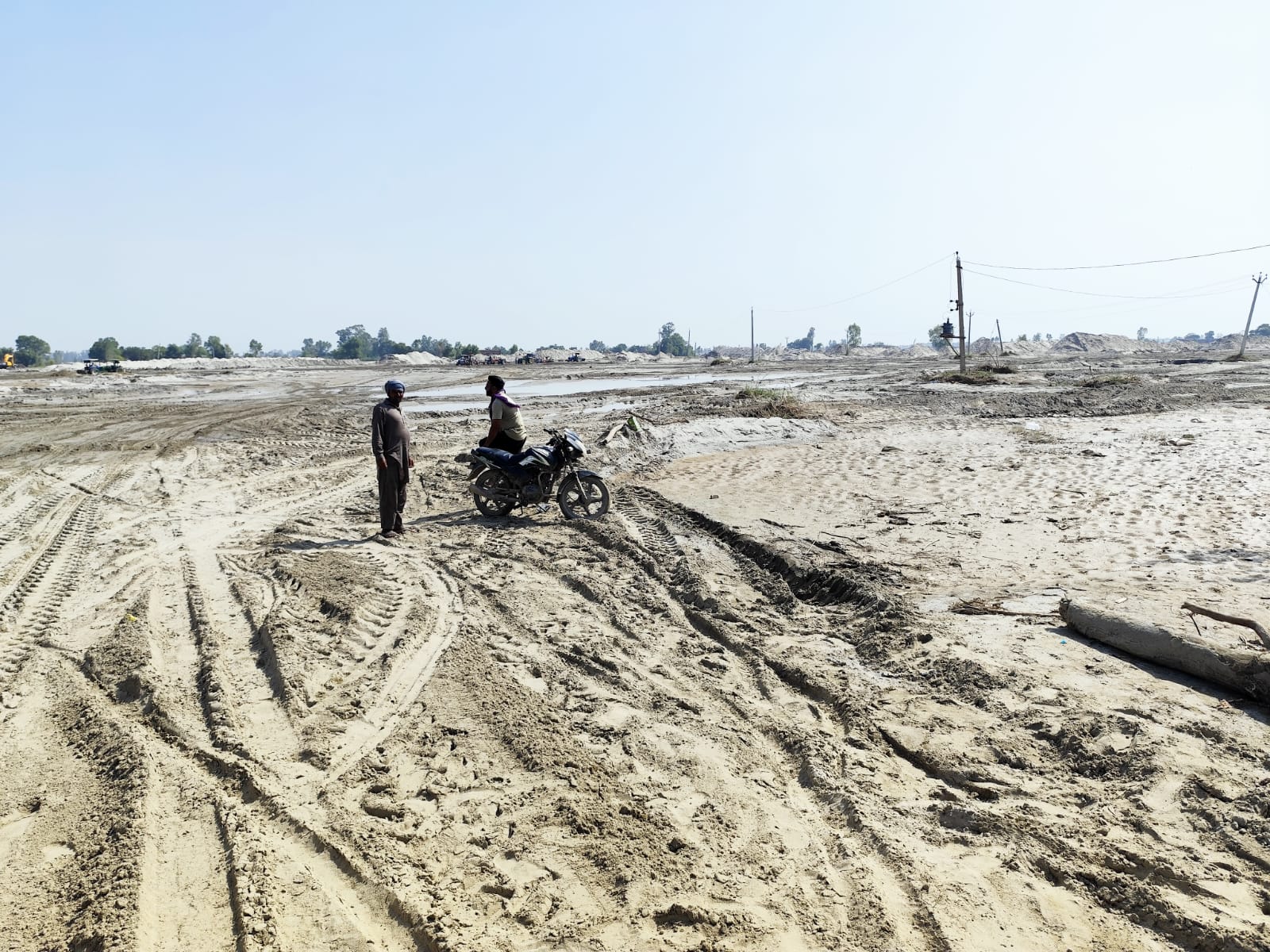
Floods: Compensation, Livestock Health & BBMP Restructure
On 14 Oct, Union Agriculture Minister Shivraj Singh Chouhan released compensation of USD 1.3K for repairing damaged houses and an additional USD 454 for constructing toilets per house for 36,703 houses damaged in the recent floods. As the Panjab government begins disbursing flood relief funds—USD 4,444 in case of deaths to USD 414 per cow or buffalo—farmers are closely monitoring compensation details, ensuring they align with the guidelines as per the union and state governments under the State Disaster Response Fund because they feel they were cheated after the 2023 floods. Meanwhile post floods, livestock health has emerged as a silent casualty. Veterinary experts warn of a growing crisis—mineral deficiency in animals that could severely impact dairy productivity and rural livelihoods. Vivek Sharma and Karamjit Sharma from Punjab Agricultural University emphasized that minerals—often overshadowed by energy and protein in feed formulations—were vital for an animal’s immunity, fertility, digestion, and milk yield. With floodwaters disrupting fodder supply chains, contaminating grazing areas and delaying concentrate preparation, the risk of deficiencies has intensified. Guru Angad Dev Veterinary and Animal Sciences University, Ludhiana has developed an area-specific mineral mixture to address these gaps. Experts recommend its use to prevent long-term health setbacks. Concurrently, the Indian union government has proposed a major amendment to the Punjab Reorganisation Act, 1966, aimed at restructuring the Bhakra Beas Management Board (BBMB), a move that can potentially dilute Panjab’s role and influence in the inter-state body. At present, only Panjab and Haryana have permanent members in the BBMB. The proposed amendment states that the Board shall consist of a whole time chairman and four whole time members, one each from the states of Panjab, Haryana, Rajasthan, and Himachal Pradesh. Panjab's ruling Aam Aadmi Party spokesperson Neel Garg said the union government's move exposes its anti-Panjab mindset and represented yet another deliberate attempt to weaken Panjab's control over its water and power resources. The amendment is truly ironic because Panjab’s experience in the last 69 years points towards the full control of BBMB coming to Panjab but now Panjab’s stake is being further diluted (earlier coverage).

Floods: 30% Per Acre Drop in Paddy Output
In the 2025 monsoon harvest season, early sown paddy crops have reported reduced yields, with farmers estimating an average loss of USD 181–215 per acre. Talwinder Singh from Jalandhar sowed PR-126, an early maturing, low water-use paddy variety with high yield, and Supreme 110, a newer variety that aims for high production in a shorter timeframe, on 8–9 Jun after the Panjab government advanced the transplanting window. He harvested only 22–23 quintals per acre, compared to 31–32 quintals per acre last season. His loss per acre is around USD 227, calculated at the Minimum Support Price (MSP) of USD 27 per quintal for paddy. Talwinder said, 'Last year, I sold around 32 quintals per acre and earned USD 841 per acre. This year, with just 23 quintals, I will make only around USD 625. When you subtract the input cost, which is at least USD 227 per acre, the profit margins are only USD 395, out of which around USD 340 is rent for one acre per crop, and the profit margins are even less than USD 56.’ Talwinder has rented 60 acres. 'We followed the government’s schedule, but now we are paying the price. If there is no support, many of us will fall into a debt cycle again,' continued Talwinder. Another issue with paddy this year is high moisture and blackening of grains which have lowered the price. A team from the Union Ministry of Food and Public Distribution has drawn at least 100 samples from the freshly harvested paddy crop in 19 districts of Panjab to assess its quality. The results will be crucial in determining whether the union government will approve a relaxation in the permissible limit of discoloured grain. Meanwhile, farmers allege that fertilizer dealers and agricultural societies are compelling them to purchase nano urea or nano Diammonium Phosphate bottles while buying subsidized fertilizer bags. These bottles, they claim, are often of no use and are not even recommended by Punjab Agricultural University (PAU) (earlier coverage).
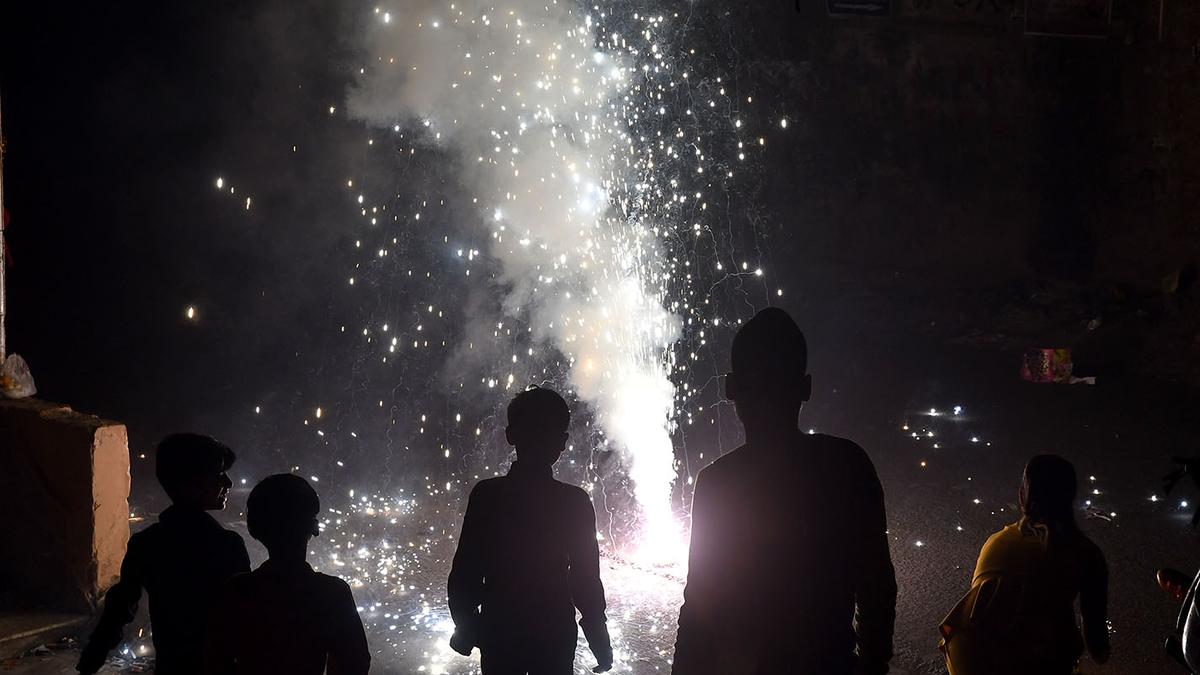
Delhi’s AQI Skyrockets on Diwali; Researchers Support Cash Incentive to Farmers
According to the Punjab Pollution Control Board, Panjab has recorded a total of 241 stubble burning incidents between 15 Sep–18 Oct. The state had recorded 10,909 farm fires in 2024 and 36,663 in 2023. Yet, on the eve of Diwali (festival of lights), Bharatiya Janata Party convenor of Information Technology cell—propaganda platform—Amit Malviya blamed the pre-Diwali air pollution on Panjab’s straw burning. On 19 Oct, Delhi's air pollution—attributed to Panjab over the last decade—was 325 on the Air Quality Index (AQI). On the night of Diwali, after the crackers were burst, the AQI was 1768. On 15 Oct, the Supreme Court of India relaxed the ban on fireworks in Delhi and the National Capital Region (NCR) and allowed the sale of green fireworks. Neither did people from Delhi cease bursting crackers when they were banned earlier, nor did they follow any green norms this time. Meanwhile, a new study published by Assistant Professor Sujit Raghunathrao Jagadale and researcher Javed Shaikh from Indian Institute of Management Amritsar, published in the Journal of Macromarketing argues that stubble burning is not a reckless tradition but the by-product of policies, markets, and survival pressures that leave farmers with no alternative. The researchers found Minimum Support Price (MSP) on rice and wheat is a noose around the neck of the farmer. On the one hand, MSP offers income security but by incentivizing the cultivation of just two crops, MSP discourages diversification. With just two weeks between paddy harvest and wheat sowing, farmers see burning as the only practical, cheapest, and quickest option to clear fields. The state penalizes stubble burning, but its policies create the conditions that make burning straw inevitable. The second aspect is the commission agent who controls crop pricing, loans, and market access, often leaving farmers too indebted to invest in alternatives. The researchers call for creating a value chain for stubble—assured prices, markets for stubble-based products, energy plants using biomass, and cash subsidies for transport. Jagadale said cash incentive per acre could motivate farmers to switch to sustainable practices (earlier coverage).
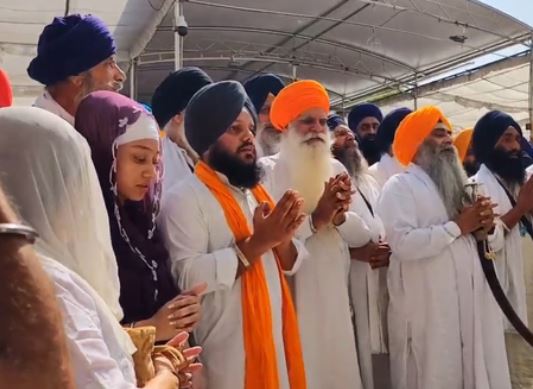
Breakaway SAD Supports Mandeep Singh as Tarn Taran By-Poll Heats Up
On 21 Oct Bandi Chhor Divas (Free Prisoners Day), Head Granthi (reciter) of Darbar Sahib (Golden Temple), Amritsar Giani Raghbir Singh extended greetings to the Sikh community across India and abroad. He also made a strong appeal to the government to release Bandi Singhs (Sikh prisoners) who remain behind bars for over 30 years. Meanwhile, the breakaway Shiromani Akali Dal (SAD) led by Giani Harpreet Singh has extended support to Mandeep Singh, brother of undertrial Sandeep Singh alias Sunny, in Tarn Taran for the Panjab Legislature Assembly by-poll scheduled for 11 Nov. Most media is misreporting Mandeep Singh as a Akail Dal (Waris Punjab De) candidate. Mandeep Singh has filed his nomination as an independent candidate and is getting a lot of panthic (Sikh collective) support. The by-poll will be Bharatiya Janata Party’s (BJP) bid to gain a foothold, ruling Aam Aadmi Party’s (AAP) shot at maintaining its dominance and Indian National Congress’ (INC) attempt to put up a united show. AAP is once again banking on fielding a turncoat by fielding a former SAD leader Harmeet Singh Sandhu who won thrice in the past. Since the AAP formed government in Panjab in March 2022, the state has seen Assembly by-polls in Ludhiana West, Jalandhar West, Gidderbaha, Barnala, Chabbewal, and Dera Baba Nanak. Barring Barnala, AAP won all. It also contested Sangrur and Jalandhar Lok Sabha (lower house of Indian Parliament) by-polls in the same period. While its candidate Sushil Kumar Rinku won in Jalandhar; Sangrur seat vacated by Chief Minister Bhagwant Singh Mann went to the SAD (Amritsar). Not only in Tarn Taran but statewide, the BJP has had setbacks to its attempt to woo the Scheduled Caste votes with the suicide of Dalit (marginalized) Haryana-cadre Indian Police Service officer Puran Kumar and a shoe being thrown at Dalit Chief Justice of India Bhushan Ramkrishna Gavai. The INC launched the campaign of its candidate Karanbir Singh Burj with party leaders warning that divisive forces were trying to push Panjab once again towards an era of death, destruction, and darkness. Panjab Pradesh (state) Congress Committee (PPCC) chief Amarinder Singh Raja Warring said, 'Panjabis are proud Indians and not Khalistani supporters' (earlier coverage).
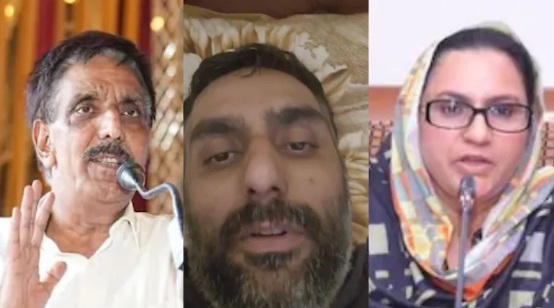
Former DGP Mustafa & Former Minister Razia Charged With Son’s Murder
On 16 Oct, Aqil Akhtar, 35-year-old son of former Panjab Director General of Police (DGP) Mohammad Mustafa and former Panjab Indian National Congress minister Razia Sultana was found unconscious in his home at Panchkula, a satellite town of Chandigarh in Haryana. He was rushed to the Civil Hospital where he was declared brought dead due to drug overdose. Akil was a lawyer in the Punjab and Haryana High Court who is survived by wife Jainab Akhtar, a son, and a daughter. In a video recorded by Aqil in August 2025, he alleged that his father and his wife were having an affair. After Aqil’s burial, both Mustafa and Razia have been charged with murder. 1985 batch Indian Police Service officer Mustafa used to be close to former Panjab Chief Minister Captain Amarinder Singh. Dispute grew between them when Amarinder did not make him head of state police and promoted his junior Dinkar Gupta. After retiring, Mustafa became active in Indian National Congress (INC) and was advisor of its leader Navjot Singh Sidhu. Human rights organization Ensaaf lists Mustafa responsible for 18 cases of abduction or disappearance and/or extrajudicial killings. Meanwhile, the Border Security Force (BSF) posted on the 553-km-long India-Pakistan frontier in Panjab has arrested around 350 smugglers since January 2024, averaging one arrest every alternate day. Also, Panjab has seen a five-fold increase in smuggling of arms from Pakistan through the Panjab border, with 362 weapons, including AK-47 rifles, grenades, and improvised explosive devices, seized so far in 2025 compared to just 81 in 2024. Concurrently, in the Sikhs for Justice legal counsel Gurpatwant Singh Pannun case, the main accused Nikhil Gupta is trying to change his lawyer before the 3 Nov hearing of the case. This is typically done when a defendant wants a last minute delay of the trial and there is no other justification to postpone the hearing (earlier coverage).
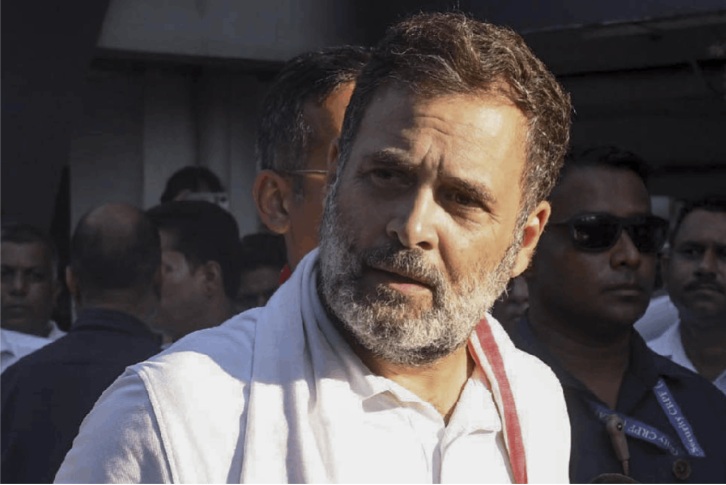
Varanasi Court Dismisses Case Against Gandhi; NGT to Probe Radha Soami Dera
A Varanasi, Uttar Pradesh court has dismissed a petition against Indian National Congress' Leader of opposition Rahul Gandhi over his remarks concerning the Sikh community made during his visit to the US in 2024. The case was filed by Nageshwar Mishra. Additional Chief Judicial Magistrate Neeraj Kumar Tripathi quashed the complaint, observing that the petitioner had 'merely expressed an apprehension' that Gandhi's comments could be exploited by Khalistani elements to incite violence or spread misinformation about India abroad. Meanwhile, on the basis of a complaint by head of Ghaneta village Seema Kumari, the National Green Tribunal (NGT) has constituted a joint committee to verify the factual position regarding the allegations of tree felling, illegal construction, and the use of a tea estate land leveled against the Radha Soami Satsang Beas at Parour in Kangra district, Himachal Pradesh. Concurrently, a huge amount of plastic waste and other trash in the Nangal hydel canal has people worried here as many drinking water schemes rely on it. The trash can be seen up to 6 km from Nangal town where the canal starts and runs for 64 km from Nangal to Rupnagar. Thereafter it joins the Bhakra main line canal, which takes the river Satluj waters to adjoining states. In another case, the Supreme Court of India has summoned the health department officials of Panjab, Chandigarh, Himachal Pradesh, and Delhi, for failing to comply with its directions to frame uniform standards for patient safety in Intensive Care Units (ICUs) and critical care facilities. Meanwhile, a Panjab government survey revealed lapses in the availability of essential medicines at the Aam Aadmi Clinics, Panjab's flagship primary healthcare project. The assessment found that nearly 68% of the clinics—596 out of 881—did not maintain the required stock of essential drugs as per official standards. Also, the Panjab University, Chandigarh recently celebrated its 143rd Foundation Day. However, the invitation to the event was in English and Hindi ignoring Panjabi. Ashmeet Singh, Vice President of the Students Council boycotted the program (earlier coverage).

That Girl—Param
The song That Girl dropped on YouTube at the end of September 2025. Within three weeks, the debut single has gathered 11M views. That Girl is by 19-year-old rapper and singer Paramjeet Kaur, who goes by the moniker Param, and is based in Duneke, a sleepy village in Panjab’s Moga district. Produced by British record producer Amrinder Singh Sandhu alias Manni Sandhu, the track has been backed by an independent record label, named Collab Creations, shot in Sahibzada Ajit Singh Nagar and made without the help of industry heavyweights. 'We did not record this track in an expensive studio. There was no acoustic treatment…You could hear cars outside, but still, the vocals were extremely crisp,' Sandhu says in a video he put out on Instagram. Sandhu took these vocals back to his UK studio, added some final touches, and asked his friends Dilsher Singh and Khurpal Singh, who call themselves Tru Makers, to shoot the music video. What has earned Param the spotlight is not just the raw energy in her voice, but also her authentic tone, powerful singing, and a challenge to the typical trope of a Panjabi woman singer who often sings folk or pop. In the hyper-masculine rap scene of Panjabi music, where women are often reduced to props in music videos, Param isn’t doing the emceeing in street vernacular—she has also composed the track with Jashanpreet Singh alias Saab. Param’s swagger isn’t a rip off—it is her own and is born out of a struggle to survive. Growing up in Duneke, where her mother works as house help and her father is a daily-wage laborer, Param got interested in rap when she was in grade 10 at the village’s government high school. Her interest in music surged when she took music as a subject at Dayanand Mathra Dass College in Moga. Off the microphone, Param’s voice softens as she talks of becoming a musician so she can build a 'proper house' for her parents. She says, 'I just want to support my family. I want to build a really nice house for my parents. I want them to sit at home and just relax.'
Notes
Suggested Reading
Novita Singh in Newslaundry: After floods wrecked harvest, Panjab stares at straw puzzle.
Like what you're reading? Subscribe to our top stories.
Liv Forum provides a digest of analysis on major issues facing Indian (East) Panjab and Sikhs globally.
In accordance with our Privacy Policy, we will never share or sell the information of our subscribers.
PM Modi Visits Dera Sachkhand Ballan; BJP Wins Chandigarh Mayoral Elections
Panjab: PM Modi Visits Dera Sahkhand Ballan; BJP Wins Chandigarh Mayoral Elections; Trump Announced US Tariffs To Be Lowered; India-EU Sign FTA; CM Mann Invokes Bhai Kanhaiya in SYL Talks with Haryana. Sikh: Police Picks Up Two from Darbar Sahib; Panjab-based Sikh Organizations Commemorate 1986 Sarbat Khalsa—and more stories.
Delhi Court Acquits Sajjan Kumar in 4th 1984 Sikh Genocide Case
Panjab: Rally by independent journalists; Operation Prahar against gangsters & associates. Sikhs: Sajjan Kumar acquitted in 4th Sikh Genocide case; US Bill to prevent discrimination against Sikhs; UK report flags rising anti-Sikh sentiment—and more stories.


